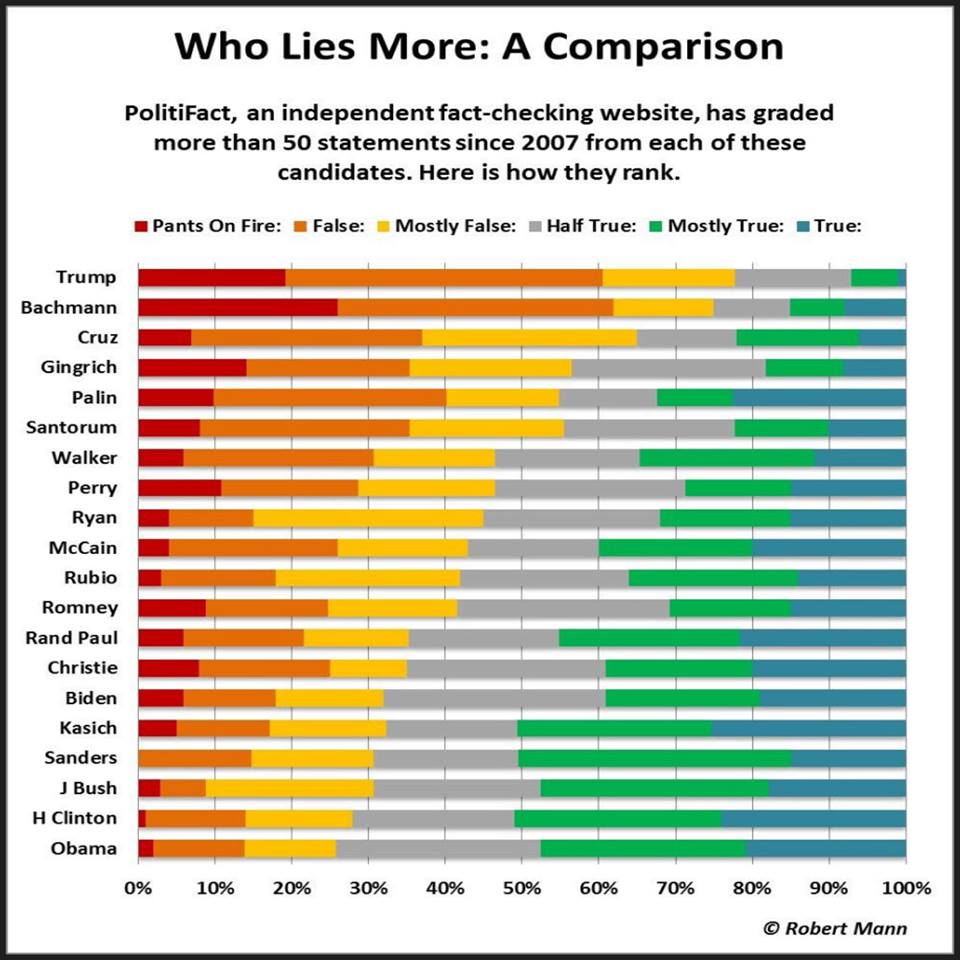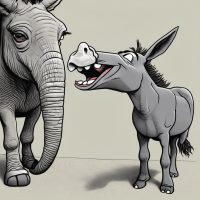Trump lies a lot. A lot more than Clinton, yet she is the one who is more distrusted. While
she’s not one hundred percent honest — Who is? Studies estimating the number of lies told per day range from 1.64 to 2.92 to 4.5 a day — she has been rated as more honest than Trump by a lot. As the chart shows, approximately 28% of Clinton’s statements since 2007 are less than half true, 78% of Trump’s statements aren’t even half true. Seventy-eight percent!
This is the story of how we became the UNITED FUCKING STATES OF FUCKING STUPID!

From Michael Sandberg’s Data Visualization Blog
What do we call people who are so out of touch with reality? We call them CRAZY! Has the American electorate gone completely insane? No, our perceptions have been manipulated. We are the United Fucking States of Fucking Stupid. So, we have two questions:
- Why do we believe political lies? Or, why are we so easily manipulated?
- How can we evaluate Hillary Clinton’s judgment and honesty? Or, does she really have poor judgment or is dishonest?
Believing Political Lies
One of the first things we do when we receive information is try to determine its
believability. Apparently, we do this by comparing it to similar information to determine if it is in agreement or not. That sounds pretty reasonable.
See! You just did it! Right? I just gave you some information, and you just decided whether you would believe it or not. Think about how much information you take in every second of every day; this process must be very fast and constant. And, mom — my only regular reader — knows that this is an EMOTIONAL process.
Emotions are used to tweak our focus so that we attend to the important occurrences in our environment. It has to be fast, constant, and convincing.
 So, when Paul Manafort sits on Meet the Press and says that You cannot believe anything Hillary Clinton says, and we apply the evaluative algorithm, we activate our associative web concerning Clinton. The links of the web provide a sense of emotional congruence or incongruence. Everybody knows that Clinton is dishonest, so sure it is true.
So, when Paul Manafort sits on Meet the Press and says that You cannot believe anything Hillary Clinton says, and we apply the evaluative algorithm, we activate our associative web concerning Clinton. The links of the web provide a sense of emotional congruence or incongruence. Everybody knows that Clinton is dishonest, so sure it is true.
Why don’t we assess the statement using facts as represented on the chart above? Because thinking is slow, irregular, and not necessarily convincing. We trust our emotions more than our reasoning. In short, thinking is hard. Thinking takes effort and energy. We need to conserve our energy — think evolution and, mom, where does that put us? That’s right, the hunter-gatherers of 40,000 years ago.
Correcting Lies
 That chart disproves the widespread notion that Hillary Clinton is a dishonest political liar. How can people argue with that? One thing they’ll argue against is the source. The source of the information in the chart is Pulitzer Award winning Politifact. But, you cannot believe anything in the media because of liberal bias and lies lies lies! Amirite? This is a convenient way of refuting all facts that you disagree with. But, it is also effective.
That chart disproves the widespread notion that Hillary Clinton is a dishonest political liar. How can people argue with that? One thing they’ll argue against is the source. The source of the information in the chart is Pulitzer Award winning Politifact. But, you cannot believe anything in the media because of liberal bias and lies lies lies! Amirite? This is a convenient way of refuting all facts that you disagree with. But, it is also effective.
Once the information makes it in to your associative network, i.e. memory, you tend not to recall the the source or circumstances of the information. It just is. So, even if the source is discredited, that doesn’t make it into the network or is not linked as strongly and so is less likely to be activated.
Here’s a typical example:
- Candidate Generalis Mendax: My opponent, Adversari Pseudolo, is a cat murderer!
- Candidate Adversari Pseudolo: I’m not a cat murderer! I’m not! I’m not! I’m not!
- Candidate Generalis Mendax: Oops, sorry. I misspoke. I meant to say that Adversari Pseudolo had a cat that died once.
The news that Adversari Pseudolo is a cat murderer is emotional. It is strongly encoded. It produces a strong dislike and distaste for Adversari Pseudolo. When the lie is corrected and withdrawn, the correction is not strongly encoded and is easily forgotten. When asked most people will say, I do not believe Adversari Pseudolo is a cat murderer, but I don’t like her. The emotion stays. It is insidious.
And when the new information conflicts with a deeply held belief, it doesn’t sound right and therefore is rejected.
When a Lie Becomes Normal
 Back to the hunter-gatherers! On the savannah, anything that is surprising is out of the ordinary and could be dangerous. Something that isn’t surprising has been encountered before and has been proven to be not dangerous.
Back to the hunter-gatherers! On the savannah, anything that is surprising is out of the ordinary and could be dangerous. Something that isn’t surprising has been encountered before and has been proven to be not dangerous.
As events, information, objects in our surroundings repeat, they get more deeply embedded into our associative network so that when they are encountered, they seem normal, and we do not waste time and energy responding to them. If we did, we mightn’t have the energy or awareness to respond to the thing that is surprising and dangerous. And, that could lead to our death and a removal of our genes from the gene pool, which ruins your whole day and maybe even your whole weekend.
The repeated lie becomes normal. In a sense, it becomes true. It is accepted at any rate. So, Clinton did something wrong during Benghazi — we don’t know what because she’s been repeatedly and thoroughly exonerated for it, but we’re sure it was something. It’s that nagging feeling in the back of your head. She broke the law by using a private server and deleting personal email. She didn’t. She was exonerated for that, too. But, we’re sure of it. There is that disturbing little tickle back there. She’s responsible for the destruction of Libya. She’s not and that is a demonstrable fact, but we have this nagging feeling that she is. She murdered Vince Foster. She didn’t. It has been proven and demonstrated over and over again. But, maybe she did. Were you there? How do you know?
These lies about Hillary Clinton have become woven into the fabric of our perceptions. We believe them unconsciously. Unquestioningly? They are the standard against which we judge any news about Clinton. That backdrop has been set, and it is damn near impossible to undo it.
Clinton’s Judgment
 Sanders contributed a new allegation for our mythos of Hillary Clinton: she has poor judgment.
Sanders contributed a new allegation for our mythos of Hillary Clinton: she has poor judgment.
Judgment is a type of prediction that forms the basis of a decision or conclusion. If you have good judgment, you make good decisions and come to sound conclusions. If you have poor judgment, you make bad decisions or come to erroneous conclusions. Was it a good decision to invade Iraq the second time? In hindsight, the answer is clearly no — did you get it this time Jeb! But, at the time we were deciding, we were all making a prediction — what would happen if we did and what would happen if we didn’t? Was the information about weapons of mass destruction accurate or was it not?
Part of your judgment concerning the decision to invade depended on your trust of the source of the information. If you trusted W — and who could trust such a beady-eyed ruddy brush-clearer like that? — then you predicted that WMD’s would be found, and it was a good choice. If you didn’t, then you predicted that WMD’s wouldn’t be found, and it was a bad choice.
Your associative network also is a big part of your judgment mechanism. Your assessment of an impending decision depends on your emotional reaction to the elements that you have associated with it. I was recently confronted with a choice: accept a job in Turkey or China. My association with Turkey was one of deteriorating political stability and vulnerability to the instability of the region. It made the decision easy. And, it has been born out by subsequent events. My judgment in choice of country to move my family to, was sound. It was based on the elements of my associative network and my emotional reaction. Turkey scared me. China bored me.
 When considering invading W’s invasion of Iraq, my judgment was that it was a bad idea. It was based on the elements of my associative network where W was concerned, WMD’s, the region, and oil as a resource. All of the resulting emotional responses told me it was a bad idea.
When considering invading W’s invasion of Iraq, my judgment was that it was a bad idea. It was based on the elements of my associative network where W was concerned, WMD’s, the region, and oil as a resource. All of the resulting emotional responses told me it was a bad idea.
My associative network did not have a web of political expediency, though. I didn’t have to consider how my decision of the invasion would effect my political future. Like it or not, all politicians have this segment in their associative network, and it influences their judgment.
The only way to assess judgment is by looking at the outcomes of decisions and accuracy of conclusions. In general, success in any field reflects good judgment since the person has had to make decisions and come to conclusions to get to where they are. By all accounts, Clinton is successful. Does this mean she has sound judgment? Trump is a wealthy business man. Is it because of his good judgment?
I thought that W’s decision to invade Iraq was damning. It showed a fundamental lack of judgment to have made a blunder of such magnitude. But, was supporting the invasion also a lack of judgment? Predictions are difficult to make accurately. The future is uncertain.
What is Clinton’s track record of decisions? She championed healthcare reform, and it failed. She supported healthcare insurance for children, and it passed. She has waffled on immigration and gun reform. Does waffling demonstrate a fundamental lack of judgment or good judgment? Do we want politicians to act on their strongly held beliefs or adjust their actions based on the shifting public opinion over time?
What about Trump? Are his bankruptcies evidence of bad judgment or a judicious application of the rules and shifting economic fortunes?
What do your emotions tell you? What is your gut instinct here? Can you trace your gut instinct to elements of your associative network? I would love to see your answers in the comments.
Your Drunk Uncle
 So what do you tell your favorite drunk uncle at your next Thanksgiving dinner when he starts bitching about President Killery? First, don’t let it get there. Preempt it, not by praising President Clinton or even talking about Clinton or politics.
So what do you tell your favorite drunk uncle at your next Thanksgiving dinner when he starts bitching about President Killery? First, don’t let it get there. Preempt it, not by praising President Clinton or even talking about Clinton or politics.
The problem is there ain’t nothing that can be said about Hillary Clinton that hasn’t already been said on either side. It is the most complete manipulation of the public’s perception of one person in the history of human kind.
So, when in doubt, make a joke. Get your drunk uncle to laugh. Laughter and happiness makes us less argumentative and less likely to be cognitively engaged. If he is laughing, then he’s less likely to argue.
 Get him to agree to something. Not about Clinton, but with something that she’s accused of having done. Lying is so universal that we’ll all be able to agree there. Some lies are understandable like Bill Clinton’s lie about his relationship with Monica Lewinsky. Who didn’t look at that situation and think, hell, I’d lie, too. You want to produce that’s a situation for him with Hillary Clinton.
Get him to agree to something. Not about Clinton, but with something that she’s accused of having done. Lying is so universal that we’ll all be able to agree there. Some lies are understandable like Bill Clinton’s lie about his relationship with Monica Lewinsky. Who didn’t look at that situation and think, hell, I’d lie, too. You want to produce that’s a situation for him with Hillary Clinton.
Another situation that everyone can probably relate to is the benefit of the doubt. Again, engage him in a conversation about the benefit of the doubt. Focus on examples of when you’ve been afforded the courtesy. He will naturally think of times he did, too.
Once you’ve seen someone else doing something objectionable that you’ve done, it is
much more difficult to be condemning of them. You’ll need to anticipate these conversations. Bring up the lying, benefit of the doubt, and discussions of lapses in judgment BEFORE the topic of Hillary Clinton comes up.
If you’re in awe of the completeness of the smearing of Hillary Clinton by Republicans, then you have an adequate understanding of the situation. It is as awe inspiring as it is awful.
Categories: Cognitive Psychology



















Again and again what Mr. Trump says about Mrs. Clinton is pure and simple projection. (Psychological projection is a theory in psychology in which humans defend themselves against their own unconscious impulses or qualities (both positive and negative) by denying their existence in themselves while attributing them to others.)
Little bullies do that in the playground and get away with it for a while but how does Mr. Trump seem to get away with it? One reason ay be we have developed a class of unthinking and unprincipled group big enough to give him credence. How sad for a supposedly civilized society!
I trust the ‘crooked Hillary infinitely more than the real crook – Donald.
LikeLiked by 1 person
As a former teacher and professor of 28 years, I completely agree that the “dumbing down of America” trends we are seeing in this year’s election are durectly related to failures in our education system. Teaching to the test and lack of concern for critical thinking in our curriculum is deadening our students minds. Social Media can also take some of the blame here for over reliance on emotional manipulation so. l
LikeLiked by 1 person
Howdy Usfman!
I agree. We’ve also neglected civics. We don’t really teach how our government works, the basic tenets of democracy beyond one person one vote, and our responsibility to be informed. I’m hoping that we’re at the extreme end of the pendulum swing and we’ll be moving back towards sanity.
Huzzah!
Jack
LikeLike
I have been watching the media manipulate the American public for 50+ years now (I can’t say before age ten it ever occurred to me that the media ever lied about anything), and have been completely disgusted by how they have villainized Ms Clinton. I have fact checked out the wazoo on all the candidates we have had this election cycle (as I have done religiously for every election since I began voting) and can only think that their actions against Ms Clinton are because 1. she is female, 2 she doesn’t kowtow to the media, 3. they are idiots. Their shoving of Trump down our throats I believe started out simply as a way to get those almighty ratings..and it has turned on them. Trump unfortunately wouldn’t know the truth if it leaped up and slapped him silly on nationwide TV. His concepts for government terrify me. They are so reminiscent of Mussolini and no one seems to see it. He meets the DSM R-3 criteria for a particular personality disorder that scares the crap out of me. THIS is what America wants? Here’s hoping this post of yours goes viral. I for one, am reblogging it as many places as I can in the (probably vain) hopes of something THINKING instead of reacting emotionally for a change.
LikeLiked by 1 person
Thank you for your fire and passion. Trump is indeed a certifiable narcissistic personality disorder. I’ve seen more than one person on TV mention his poor attention span which speaks to his poor executive function skills. I predict that Trump will resign shortly after the glory of the inauguration should he win. And a Pence presidency is just as scary — other reasons –as a Trump presidency.
I also think that the gutting of American education has contributed mightily to our current dilemma. I was amazed at how few people really understood the party primary system — I’m looking at you Bernie supporters — and the election of president.
I recently saw a meme calling for term limits for Congress — I haven’t seen that one for years. My response was an engaged and informed electorate will act as a term limit.
And the only antidote to being manipulated is to realize that it happens and be on guard for it.
Thanks again, Suze!
Huzzah!
Jack
LikeLiked by 2 people
Well written. At this point we are choosing the lesser of two evils and if you’re a minoroty of any sort or even female of any race, your better judgement will be with Clinton (poor judgements and all).
LikeLiked by 1 person
Howdy Aka!
I really don’t think the evil of Clinton exists, and even if it does, it doesn’t even come close to that of Trump. That’s part of the point of the article. We’ve seen so much absolute crap spewed about Clinton that we can’t help but think negatively of her.
Huzzah!
Jack
LikeLike